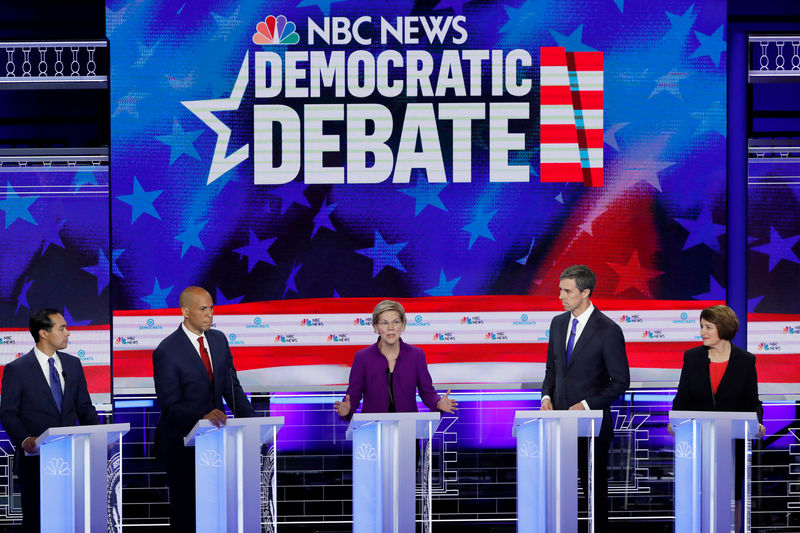By Valerie Volcovici
(Reuters) - Climate activists said they will extend a protest outside the Democratic National Committee headquarters on Thursday to demand global warming gets more attention in the party’s debates, after the issue received just seven minutes in the first two-hour face-off between Democratic White House hopefuls on Wednesday.
About sixty members of the Sunrise Movement, which has been pushing candidates to adopt aggressive policies to fight climate change, had begun its protest Tuesday on the steps of the DNC building in Washington after its chairman rejected a proposed climate-only debate, and had initially planned to leave Wednesday night.
"I was extremely disappointed. This debate really underscored why we are here," said Lauren Maunus, a 22-year-old policy coordinator for Sunrise from Florida, who had watched the debate on a screen on the back of a pickup truck parked across from the entrance to the DNC.
"I really wanted to sleep in a bed tonight but I need to be here to make sure the DNC treats climate change as an emergency affecting our generation," she added.
Benjamin Finegan, 22, another Sunrise protester, took issue with the debate format, saying it "only allowed candidates to pay lip service to the issue."
Held in Miami, a city confronted with the impacts of climate change on a daily basis, Wednesday's debate devoted four questions directly related to climate change - more than were dedicated to the issue in the 2016 debates.
Thursday's debate is expected to follow the same format, according to DNC rules.
During Wednesday's debate, Democratic hopefuls vowed to combat climate change, with several calling the issue the biggest geopolitical threat to the country.
Washington Governor Jay Inslee, asked is his plans would "save Miami?" said he would be the only candidate to make climate his first priority from day one.
Senator Elizabeth Warren said her plan to boost U.S. green technology manufacturing tenfold would create jobs and slash emissions. Former Texas congressman Beto O'Rourke briefly mentioned his $5 trillion plan, saying it would give farmers and ranchers a role in sequestering carbon dioxide, while former Maryland Congressman John Delaney promoted a carbon tax.
Most of the candidates had already outlined their proposals before the debate and none broke new ground on the issue.
